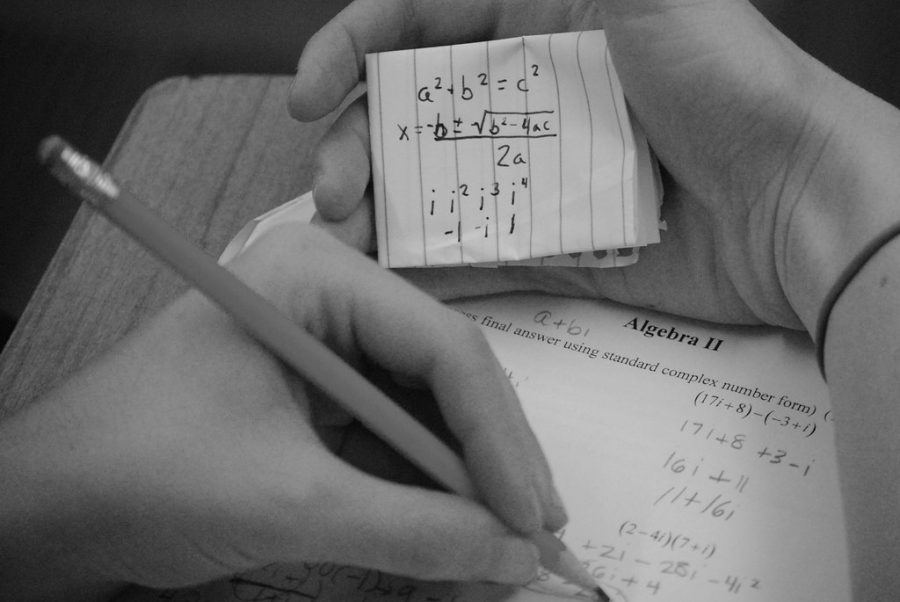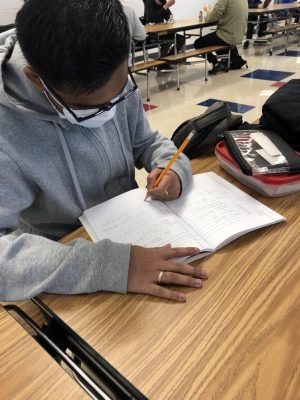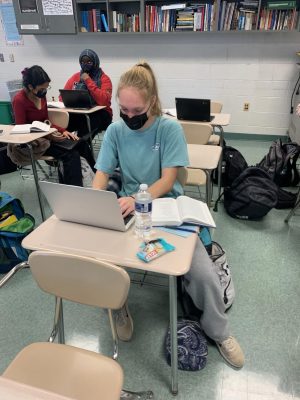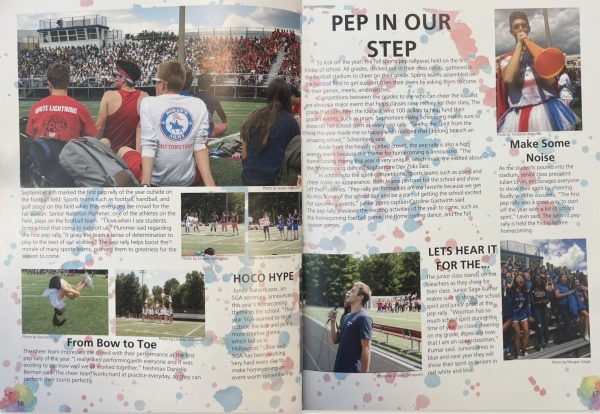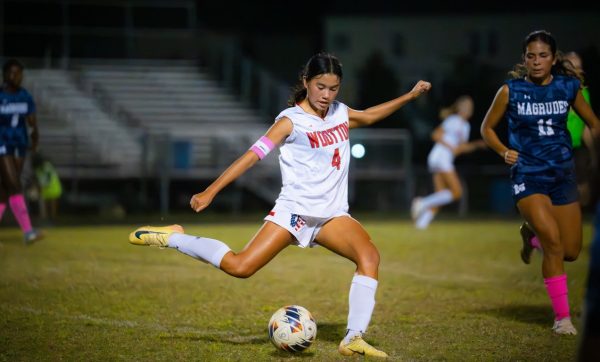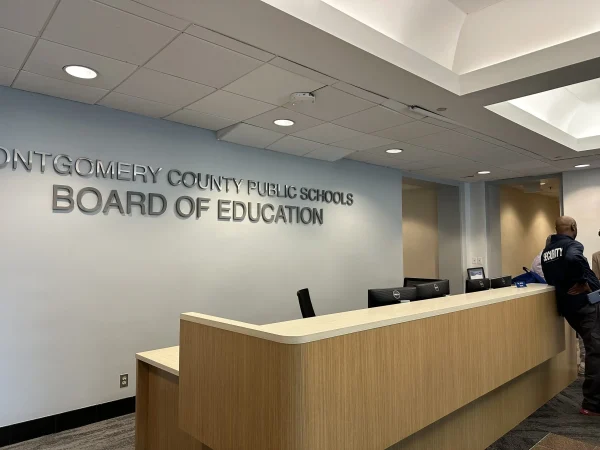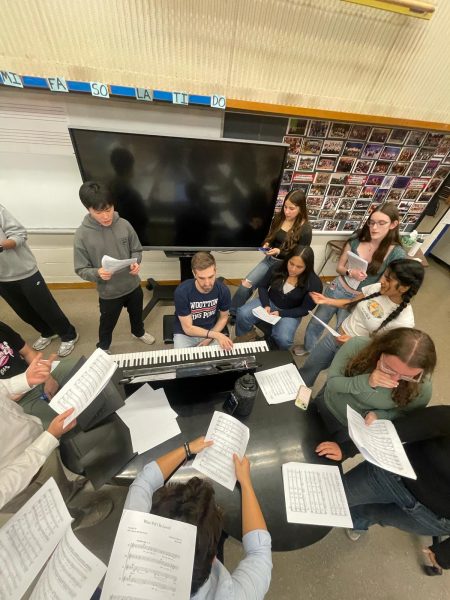Students resort to cheating under pressure from demanding workload
Photo by Sciafani used with permission from Google Commons
A student completes a math test using a hidden formula paper.
On Jan. 11, Principal Intern Bradley Rohner sent out a community update to school families, introducing a Covid-19 Q&A and a Google form for parents to submit questions. The update came in response to a number of students and parents reaching out to school faculty concerning their circumstances because of Covid. It read, “We will continue to be compassionate and lead by our actions as a school in this changing world and especially during this pandemic.”
Following the update on Jan. 18, Rohner sent out another community message to parents and guardians, notifying them of a district-wide extension for final quarter two grades. “MCPS has extended the teacher grade submission until January 27 to allow individual teachers to work with students out due to isolation, quarantine, or other excused reasons. We continue to be flexible and show compassion to resolve any issues,” wrote Rohner.
In conversations following the extension, I heard from multiple students who said they would still be unable to raise their grades sufficiently. For some, an extra week was simply not enough time to complete the work they needed to change their grade significantly. To others, my mention of the extension was the first they’d heard of it since the email was only sent to students’ parents and legal guardians. And even with the extension, some teachers still didn’t accept work past the end of the quarter.
Toward the end of quarter two, I began hearing more and more conversation among students about cheating on assignments. I saw students trading papers, taking pictures of each other’s work when teachers had their backs turned. At first, I didn’t bat an eye. It’s no secret among students, cheating has been and continues to be a prevalent issue at this school.
I’ve even heard these conversations said in front of, and directly to teachers, usually followed by little more than a head-turn or a laugh in response. But as the deadline for final grades approached and I observed instances like these occurring more and more frequently, I began questioning how it got to this point at a school as prestigious and “compassionate” as our own.
On Jan. 26, the third day of the second semester, I posted a question to Instagram: Is it possible to succeed at a school as rigorous as Wootton without cheating?
In response, among a slew of ‘no’s from anonymous students, one senior said, “Honestly, no. At this point cheating isn’t necessarily an advantage, and not cheating has become a disadvantage.”
But, why?
Several students went into depth about the pressure they felt they were under as a result of their rigorous coursework. A sophomore said, “with the amount of pressure and workload pushed onto students, no matter how lenient the deadlines are, it is impossible to get by with a good grade without cheating.”
The general consensus among those who say it is possible, is that, as one sophomore put it, “It’s possible, but it’s insanely difficult.”
Other responses suggested that to succeed without cheating, students essentially have to forfeit social and extracurricular activities. One junior said, “It’s nearly impossible if you take rigorous courses and have a life beyond school.”
According to another, “It is definitely possible, but at the expense of mental, physical, and social health.”
But for some, prioritizing school above all else just isn’t possible. One sophomore responded that “it’s possible, but only if literally everything else in your life is going right. You simply cannot be mentally ill and succeed without getting worse or cheating.”
According to the American Psychological Association (APA), “The increasing amount of pressure on students to succeed academically — in efforts to get into good colleges, graduate schools and eventually to land good jobs — tends to be one of the biggest drivers of cheating’s proliferation.”
The pressure students are under to keep their grades up with heavy workloads is only amplified by tasks and responsibilities they have outside of school. All of this makes it incredibly difficult for students to prioritize their mental health, much less view academic dishonesty as immoral. In a study done by the Canadian Journal of School Psychology, lower depression and higher psychosocial well-being was associated with better grades in both math and language courses, as well as better education behaviors.
My hope with this article is to spark recognition among administrators of the consequences felt by students under immense academic pressure. In the 2018-2019 school year, our school was in the top 1% of Maryland schools for overall test scores, but the prevalence of academic dishonesty raises the question of the validity of these scores.
Faculty need to reassess the workloads students are being tasked with. A school that so often claims to be “compassionate” cannot honestly ignore the issues of academic pressure and dishonesty plaguing its student body. Schools serve two purposes within their communities; to protect and to educate. Students of today are leaders of tomorrow, and a prestigious school that succeeds majorly due to academic dishonesty is not providing sustainable or ethical education.
Your donation will support the student journalists of Thomas S. Wootton High School. Your contribution will allow us to purchase equipment and cover our annual website hosting costs.
Senior Isaac Muffett is the opinions editor in his fourth year on the Common Sense staff. When he's not writing or researching, he spends his free time...


